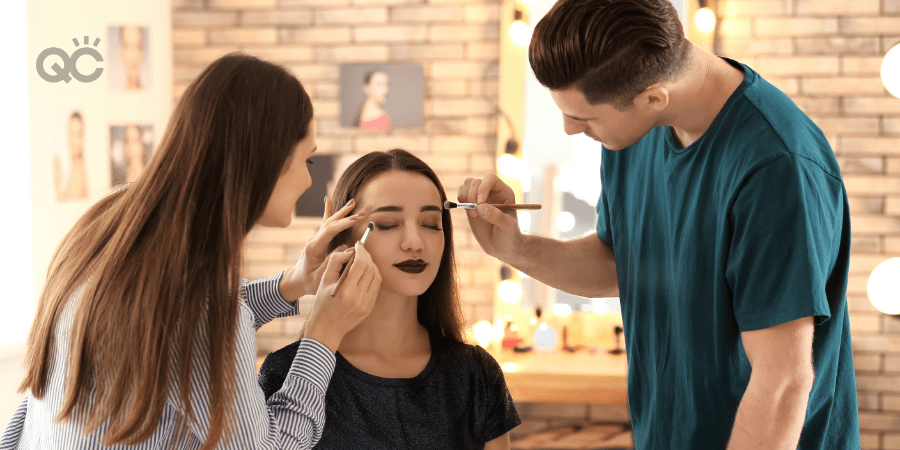Want to learn how to become a makeup artist? QC Makeup Academy Student Ambassador, Cheri Stevens, reveals why being able to accept constructive criticism is crucial to your career’s success! Cheri is currently enrolled in the Master Makeup Artistry Course. Read her full Ambassador Feature here!
So, you have a passion for makeup and have decided to turn it into an actual career. That’s awesome! You’re in for an exciting journey – but it won’t be one without hard work and dedication. If you’re serious about your craft and want to know how to become a makeup artist in the professional world, one of the key things you’ll need to be able to do is accept constructive criticism.
Constructive criticism is a very necessary tool. As an MUA, you’re more than likely going to encounter it more than once throughout your career. If you try to become a makeup artist and assume you’ll never be given feedback or critiques, it’s going to be a very jarring awakening when it eventually happens. This is why it’s important to go into your new career with realistic expectations.
Constructive criticism can come in many forms. Here are just a few general examples that one might hear in everyday life:
- Someone critiquing your outfit: “These colors are good, but they don’t best complement your features. These colors would look amazing with your hair and eye color!”
- Someone critiquing your cooking: “This chicken looks a bit too pink; it might need some more time.”
- Someone critiquing your hairstyle: “This hairstyle doesn’t flatter your face because it’s more meant for [such and such] face shape. If you ever wanted to try adding some layers, I think that’d really draw attention to your awesome bone structure!”
Constructive Criticism vs. Insults

It’s important to know that constructive criticism is NOT the same as being insulted or disrespected. The latter is meant solely to bring you down and has negative intent. Constructive criticism, on the other hand, is meant to help you. Moreover, it’s necessary for personal growth.
When someone is honest with you and providing constructive feedback, their intent is positive. They’re trying to help you see what could be done better, so YOU can do better next time. Now, I get it: receiving constructive criticism can sometimes suck. No one overly likes to hear when what they’ve done wasn’t perfect.
But imperfections are what make us human. Everyone gets constructive criticism at some point (or many points) throughout their life. But it’s important that you try your best to take with an open mind – especially while you complete your professional makeup training.
After all, if you really want to know how to become a makeup artist, the key is going to be remembering that constructive criticism will ultimately help you become the best artist you can be!
How to Become a Makeup Artist: Constructive Criticism as an MUA
Makeup artistry is a VERY competitive field. You will not be the best right away, nor will you be the only one. Constructive criticism in our field is necessary so that we can learn proper techniques and grow as an artist.
What might we hear as makeup artists, in terms of constructive criticism? Here are few examples of feedback you might get, particularly while getting trained:
- “Watch your symmetry with the eyes.”
- “Your blending needs more practice.”
- “You need to better color match for the correct skin tone.”
- “Try to do less of a blocked eyebrow and more natural, hair-like strokes.”

Why Critique from Others is Essential
Constructive criticism plays a fundamental role in the learning process. As an artist, the learning process never truly ends – you just get better at what you do. But there will always be room for improvement and growth. If you take offense to everything that’s being said about your work, you aren’t really listening to the people who are trying to help. As such, you’ll keep making the same mistakes over and over again.
As a result, this will severely impair your success in the field. You’ll only have so much room to grow before you become stagnant. Listening, learning, and applying the suggestions given to you is crucial. When you’re receptive to constructive feedback, you AND your career will soar to even greater heights because you’ll learn how to see your work with a fresh set of eyes.
For instance, would you want to create a look for someone – such as a bride – and later realize that it wasn’t what you expected? Even worse, what if it wasn’t what SHE expected? Of course not. You’d be hurting your reputation, all because you didn’t have the proper education and refused assistance. We know you don’t want that!
The Importance of Constructive Criticism in Your Makeup Course
As part of your professional makeup training, you’ll be paired with a tutor. This tutor will be an industry expert with years of experience. In other words, they know their stuff and possess an insight you don’t yet have.
If you’ve never before had proper makeup training, chances are there’ll be at least one thing you’ve been doing wrong. Your instructor’s job is to help you break bad habits, so you can instead learn how to do things the correct way. In order for them to do this, they’ll need to tell you what you’re doing right and what you’re doing wrong.
Remember: this is a natural part of the process. Everyone needs to go through it. Even they started somewhere and received the same types of critiques they’re now giving you. This type of support is essential for keeping you on the right track and giving you the proper skills to succeed!
If you truly want to know how to become a makeup artist, don’t you want to push yourself to be the best you can be?

The Consequences of Rejecting Constructive Criticism
If you’re making mistakes, it’s EXTREMELY important that you’re aware of it. More importantly, it’s critical that you understand why and what specifically you’re doing wrong. Only then can you improve and move forward with the intent of correcting your errors the next time.
Think of it this way: you wouldn’t walk into a professional restaurant and insist on cooking a meal if you didn’t know how to cook. The logic is the same for makeup artistry.
Simply put: if you continue doing the wrong thing over and over again, you will struggle to become a makeup artist. You will never learn properly and your reputation will take a massive hit.
Speaking from personal experience, the constructive criticism you’ll receive from your QC Makeup Academy tutor is going to be invaluable! Nathan Johnson has given me plenty of honest and straightforward responses to my work. He’s honestly the best!
No, your tutor is not always going to stroke your ego. But they WILL provide every last bit of feedback with kindness and knowledge. And as we all know, knowledge is the power to succeed. The critiques you receive during your training are only said with love. They’re meant to steer you in the right direction; pinpointing step-by-step what’s working, what isn’t, and how to achieve the best result.
Personally, my feedback has given me the motivation to become way more attentive to detail. I couldn’t be more grateful for it!
Constructive Criticism in the QC Virtual Classroom
This is a great way to get many different eyes looking at your work. It’s also the perfect chance to get you used to receiving constructive feedback, so you’ll be better prepared for the working world. I love that QC makes this sort of environment available to us!
In the Virtual Classroom, students and graduates are encouraged to share photos of their work. Then other students, alumni, and tutors (I’m looking at you, Nathan) can see your work and examine it. They’ll regularly congratulate what you’ve done well, as well as suggest beneficial ways the look can be improved upon in the future.
Being a part of QC Makeup Academy’s Virtual Classroom on Facebook provides a great opportunity to see how constructive criticism is offered to students. This group also demonstrates real-life examples of constructive criticism being given and received in a healthy, positive way.

Tips for Giving Productive Feedback
- Back up your critiques. Don’t just tell someone what they are doing wrong. Rather, explain which technique appears to be incorrect and why.
- Be helpful. If you’re pointing out what could have been done better, take the extra minute to explain how the individual can better that technique next time.
- Please use tact. There is no room for nastiness in constructive criticism. If you can’t phrase your feedback in a positive way, keep it to yourself.
- Make sure you are qualified to make that judgement call. If it’s not your area of expertise, or you are struggling yourself, it’s probably not your place to comment.
- Always be kind and respectful. Consider the kind of constructive criticism YOU would prefer to hear. If it would hurt your own feelings, it could very well hurt someone else’s. Getting critiqued can make people feel vulnerable. Delivering feedback in a way that makes them understand without taking offense isn’t always easy. So, it’s important to be mindful of the things you say and how you say them.
How to Become a Makeup Artist: Tips for Taking Productive Feedback
- Don’t get defensive. Constructive criticism isn’t meant to be an attack, so don’t treat it as such. In the professional industry, the way you respond to critiques can make or break your career. You’ll need a thick skin. Just try to remember that it’s coming from a good place and not meant to hurt you.
- Really listen to what’s being said. Not ALL critiques will be correct, but many of them will be. So, don’t shrug them off. Even if you initially disagree, take the time to really absorb the feedback. Try to view things objectively. As we discussed before, you’re never going to know everything. Sometimes, the only way to truly get better is by first acknowledging this.

Best of luck in your journey! 💕
As always, thank you so much for taking the time to join me today. Please feel free to comment below with any questions or comments you may have. If you’d like to connect with me directly, I’m always available to chat in the Virtual Classroom.
So long as you’re open and receptive to the constructive feedback you receive, you’ll be become a makeup artist and launch a successful career before you know it! You’ve got this!

This is very true! Really good advice in how to give constructive criticism and recieve it.
Thanks so much for taking the time to read and comment, Alby! We couldn’t agree more, and we thank Cheri from the bottom of our hearts for writing such a wonderful and informative article. <3 Constructive criticism plays such a fundamental role in the success of makeup artists. We feel it's important for aspiring MUAs to understand why it should be embraced from a positive place, rather than rejected or taken in a negative light. We're all here to push each other to be the best we can be! <3
All the best,
The QC Team